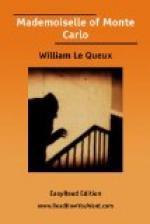“I really don’t know why,” he said. “But I scent danger long before others have any suspicion of it. If I did not, you would, many of you who are my friends, have been in prison long ago.”
“But you have such a marvellous memory.”
“Memory!” he echoed. “Quite wrong. I keep everything filed. I work yonder at my desk all day. See this old wardrobe,” and he crossed to a long, genuine Jacobean wardrobe which stood in a corner and, unlocking it, opened the carved doors. “There you see all my plans arranged and docketed. I can tell you what has been attempted to-night. Whether the coup is successful I do not yet know.”
Within were shelves containing many bundles of papers, each tied with pink tape in legal fashion. He took out a small, black-covered index book and, after consulting it, drew out a file of papers from the second shelf.
These he brought to his table, and opened.
“Ah, yes!” he said, knitting his brows as he read a document beneath the green-shaded electric lamp. “You know Franklyn, don’t you?”
“Harold Franklyn?”
“Yes. Well, he’s in the Tatra, in Hungary. He and Matthews are with three Austrian friends of ours, and to-night they are at the Castle of Szombat, belonging to Count Zsolcza, the millionaire banker of Vienna. The Countess has some very valuable jewels, which were indicated to me several months ago by her discharged lady’s maid—through another channel, of course. I hope that before dawn the jewels will be no longer at Szombat, for the Count is an old scoundrel who cornered the people’s food in Austria just before the Armistice and is directly responsible for an enormous amount of suffering. The Countess was a cafe singer in Budapest. Her name was Anna Torna.”
Mr. Howell sat open-mouthed. He was a crook and the bosom friend of the great Passero. Like all others who knew him, he held the master criminal in awe and admiration. The Sparrow, whatever he was, never did a mean action and never took advantage of youth or inexperience. To his finger-tips he was a sportsman, whose chief delight in life was to outwit and puzzle the police of Europe. In the underworld he was believed to be fabulously wealthy, as no doubt he was. To the outside world he was a very rich old gentleman, who contributed generously to charities, kept two fine cars, and, as well as his town house, had a pretty place down in Gloucestershire, and usually rented a grouse moor in Scotland, where he entertained Mr. Howell and several other of his intimate friends who were in the same profitable profession as himself, and in whose “business” he held a controlling interest.
In Paris, Rome, Madrid, or Brussels, he was well known as an idler who stayed at the best hotels and patronized the most expensive restaurants, while his villa on the Riviera he had purchased from a Roumanian prince who had ruined himself by gambling. His gloved hand—gloved because of a natural deformity—was the hand which controlled most of the greater robberies, for his war upon society was constantly far-reaching.




